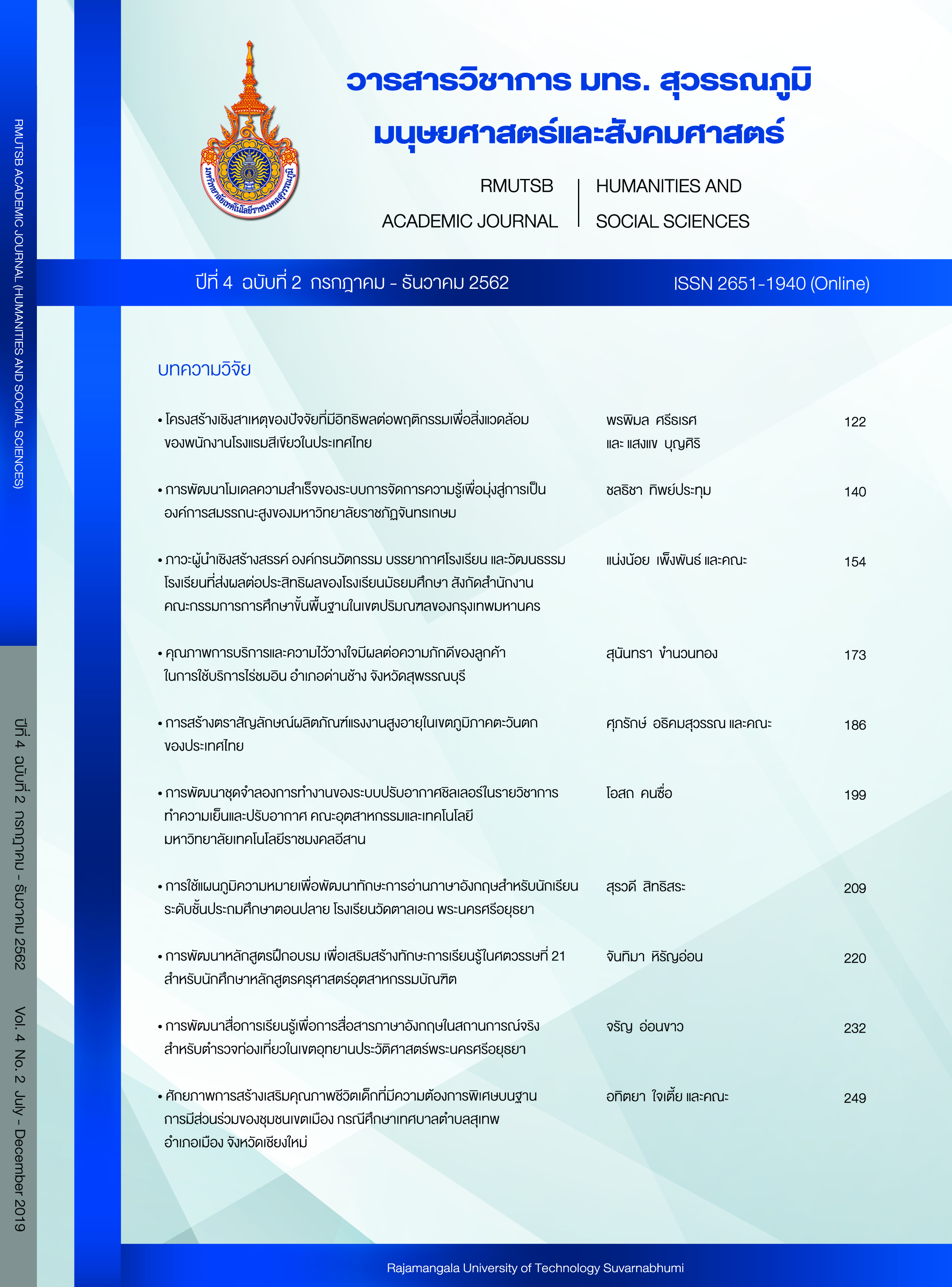Causal structure of factors that influence green behavior of green hotel’s employees in Thailand
Main Article Content
Abstract
This quantitative research is to study causal structure of factors of human resource development in green hotels and the personal intentions influencing green behavior of green hotel’s employees in Thailand. The samples were 619 operation staffs in green hotels. The instrument used in this study was 58 item-questionnaire of 5-rating scale according to Likert scale. The statistic used for data analysis were mean, percentage, average, standard deviation. The statistic used for hypothesis testing was structural equation model (SEM) by M-plus 7.11 program. The result revealed that the causal structure of factors was concordant with the empirical data with the predictability at a good level, and thus considering as an acceptable model. Human resource development factors in green hotel did not directly afftect the green behavior of employee but they affected indirectly to individual intention.
Article Details
References
Bohdanowicz, P., Simanic, B., & Martinac, I. (2005). Environmental training and measures at Scandic hotels. Sweden Tourism Review International, 9(1), 7-19.
Brown, M. (1996). Environmental policy in the hotel sector. “Green” strategy or stratagem. International Journal of Contemporary Hospitality Management, 8(3), 18-23.
Cami, N., Arnon, S., & Orion., N. (2015). Transforming environmental knowledge into behavior: The mediating role of environmental emotions. The Journal of Environmental Education, 46, 183-201.
Chan, E. S. W. (2008). Barriers to EMS in the hotel industry. International Journal of Hospitality Management, 27, 187-196.
Chan, E., & Hawkins, R. (2010). Attitude toward EMSs in an international hotel: An exploratory case study. International Journal of Hospitality Management, 29, 641-651.
Chan, E., Hon, A., Chan, W., & Okumus, F. (2014). What drives employees’ intentions to implement green practices in hotel? The role of Knowledge, awareness, concern and ecological behaviour. International Journal of Hospitality Management, 40, 20-28.
Chan, W. W., & Lam, J. C. (2002). Prediction of pollutant emission through electricity consumption by the hotel industry in Hong Kong. International Journal of Hospitality Management, 21(14), 381-391.
Chang, L., Tsai, C., & Yeh, S. (2014). Evaluation of green hotel guests’ behavioral intention. Advance in hospitality and Leisure, 10, 75-89.
Chen, M., & Tung, P. (2014). Developing an extended theory of planned behavior model to predict consumers’ intention to visit green hotels. International Journal of Hospitality Management. 36, 221-230.
Choosri, C. (2016). A zero waste management model for small hotels: A case study in the Koh Samui, Koh Phangan Surat Thani. Journal of International and Thai Tourism, 12(1), 91-118. (in Thai)
Department of Tourism. (2016). Asean green hotel. Retrieved 3 April 2019, from http://www.tourism.
go.th/view/1/มาตรฐาน_อาเซียน/TH-TH/1026/. (in Thai)
Ellen, P. S. (1994). Do we know what we need to know? Objective and subjective knowledge effects on pro-ecological behaviors. Journal of Business Research, 30(1), 43-52.
Faksang, D. (2012). Sufficient economy philosophy and the management of household’s gabage in Dusit community, Bangkok (research report). Bangkok: Suan Sunandha Rajaphat University. (in Thai)
Green leaf foundation. (2009). Green hotel. Retrieved 21 April 2017, from http://www.greenleafthai.org/th/
index.php. (in Thai)
Hair, J. F., Black, W. C., Babin, B. J., & Anderson, R. E. (2010). Multivariate data analysis a global perspective. New Jersey: Prentice-Hall International.
Han, H., Hsu, L. T., & Sheu, C. (2010). Application of the theory of planned behavior to green hotel choice: Testing the effect of environmental friendly activities. Tourism Management, 31(3), 325-334.
Kirk, D. (1995). Environmental management in hotels International Journal of Contemporary Hospitality Management, 7(6), 3-8.
Kollmuss, A., & Agyeman, J. (2002). Mind the gap: Why do people act environmentally and what are the barriers to pro-environmental behavior? Environmental Education Research, 8, 239-260.
Kongrerk, T. (2017). The model of corporate social responsibility, organizational commitment and employee green behavior. UTCC International Journal of Business and Economics, 9(2), 17-38.
Kulthakornsate, N. (2015). The structural equation model of causal. Journal of Business, Economics and Communications, 10(2), 145-165.
La, A., Weerachaleepat, P., & Patcharapuwadol, R. (2017). Green concept as the the marketing strategies: The case of Royal Princess Larn Luang Hotel Bangkok. Dusit Thani Collage Journal, 11(Special Issue), 186-197. (in Thai)
Lawrence, D. S., Cynthia, S. D., & Samuel, Y. T. (2014). Human resources practices for environmental sustainability in lodging operations. Journal of human resources in hospitality & tourism, 13, 389-404.
Martinez-Martinez, A., Cegarra-Navarro, J. G., & Garcia-Perez, A. (2015). Environmental knowledge management: A long-term enable of tourism development. Tourism Management, 50, 281-291.
Noonin, S., & Pasunon, P. (2014). Factors affecting behavior in support of being an environmentally friendly hotel: A case study of Dusit Princess Srinakarin Hotel. Dusit Thani College Journal, 8(1), 11-33. (in Thai)
Noraini, A. (2013). Corporate social responsibility and employee retention of “Green hotel”. Social and Behavioral Sciences, 105, 763-771.
Petchrot, L., & Chumniprasart, A. (2006). Research methodology. Bangkok: Pimdee Public. (in Thai)
Robinot, E., & Giannelloni, J. (2010). Do hotels' “green” attributes contribute to customer satisfaction?. Journal of Services Marketing, 24(2), 157-169.
Rossello-Batle, B., Moia, A., & Cladera, A. (2010). Energy use, CO2 emissions and waste throughout the life cycle of a sample of hotels in Balearic Islands. Energy and Buildings, 42(4), 547-558.
Sinthusiri, N., Panich, T., & Assarut, N. (2018). The effect of attitude towards green, subjective norms, perceived behavioral control, and perceived value on behavioral intention and wiliness to pay more towards Thai green hotel. VRU Research and Development Journal Humanities and Social Science, 13(1), 35-43.
Verma, V., & Chandra, B. (2018). An application of theory of planned behavior to predict young Indian consumers’ green hotel visit intention. Journal of Cleaner Production, 172, 1152-1162.
Wanichbuncha, K. (2014). Structurer equation modeling by AMOS. Bangkok: Chulalongkorn University. (in Thai)
Yixing, L. G., & Anna, S. M. (2014). Improving consumer satisfaction in green hotel: The roles of perceived warmth, perceived competence, and CSR motive. International Journal of hospitality Management, 42, 20-31.
Zeenat, B. Y., & Mariam, J. (2014). Barriers of Malaysian green hotels and resorts. Social and behavioral Sciences, 153, 501-509.


